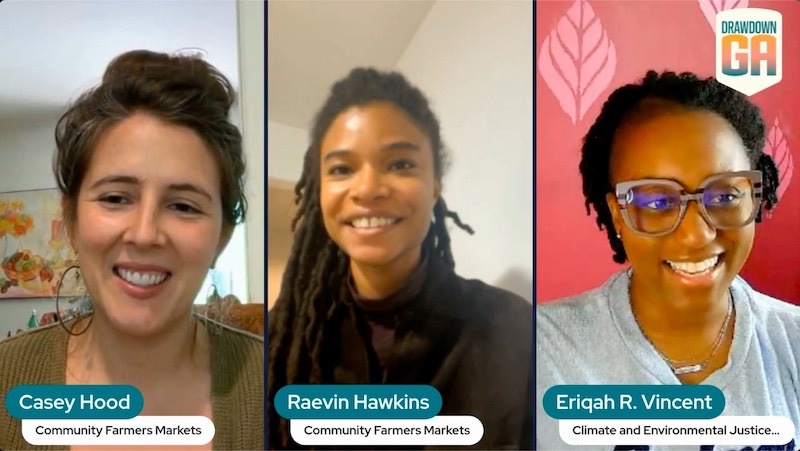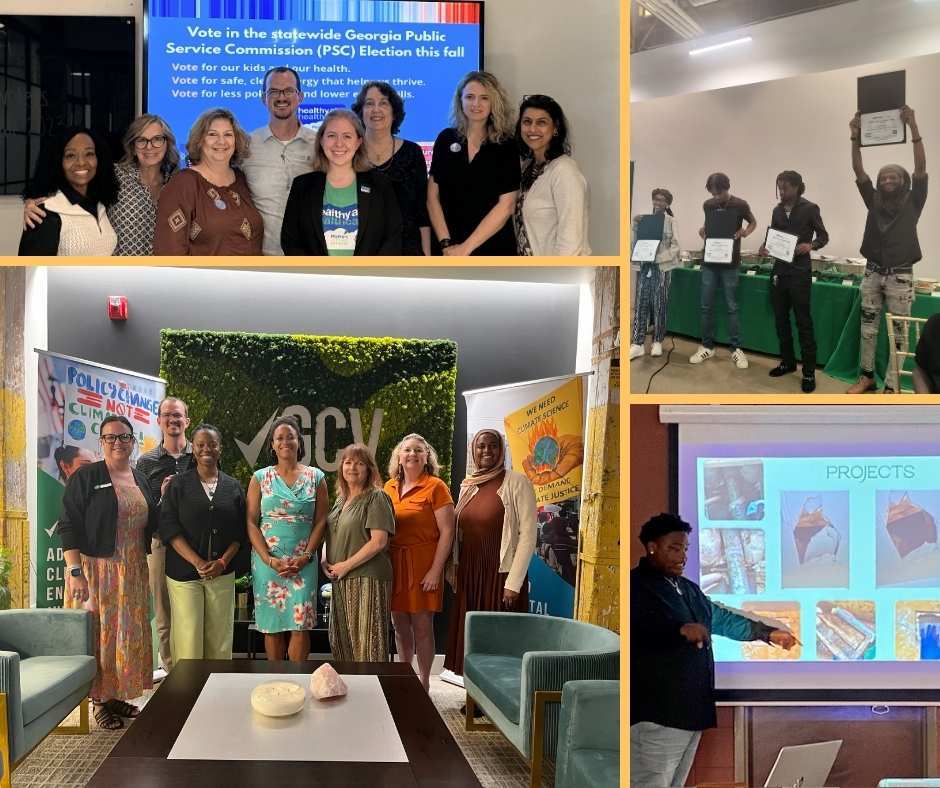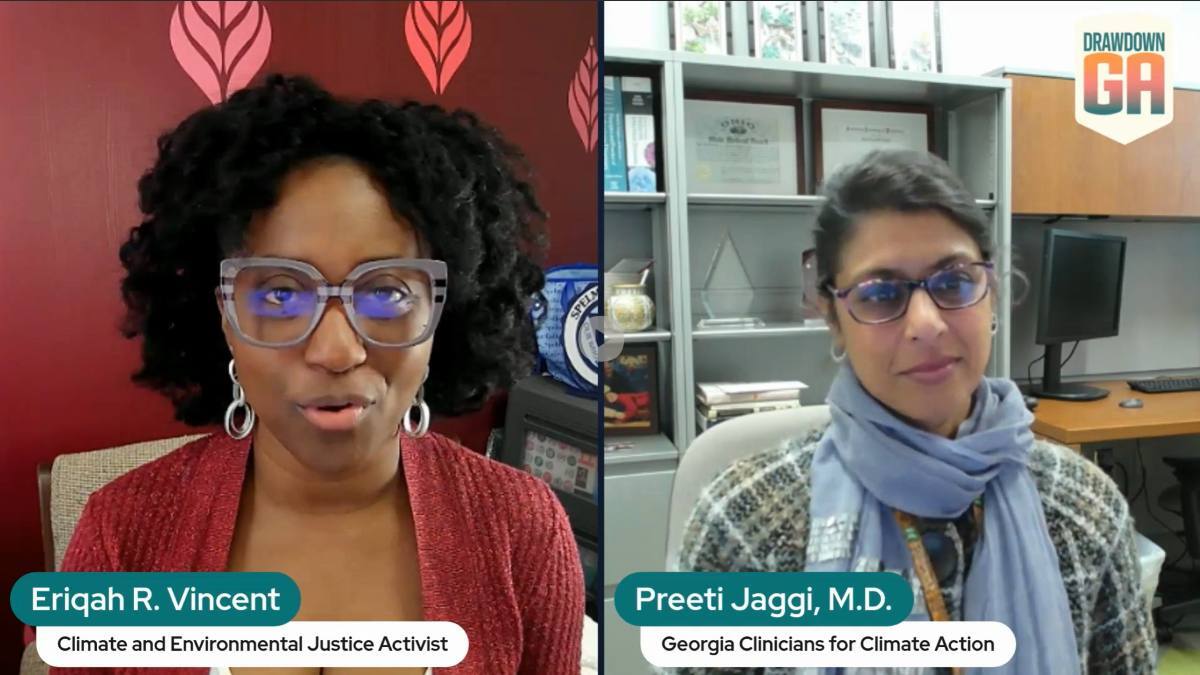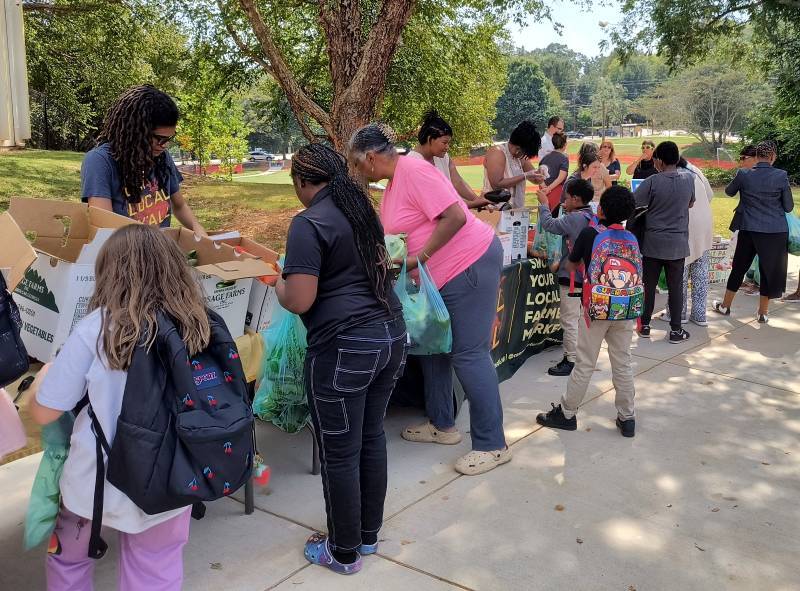In Georgia, fresh local food is more than sustenance—it is an opportunity to advance climate action and equity. Just ask Community Farmers Markets (CFM), an Atlanta-based nonprofit that is scaling several of the 20 Drawdown Georgia climate solutions in the neighborhoods that need it most.
In a recent conversation with Eriqah Vincent, longtime climate justice activist and host of the Georgia Climate Digest video series, Casey Hood, Director of Operations & Vendor Support, and Raevin Hawkins, Food Systems Innovation Manager, shared how Community Farmers Markets is reducing emissions, fighting food insecurity, and creating a sense of community.
Watch the video above to hear the full conversation, or keep reading to learn more about how CFM is growing several of the 20 Drawdown Georgia climate solutions while building equity and resilience in neighborhoods that need it most.
Scaling Solutions That Work for Georgia
Community Farmers Markets is not your average farmers market operator. Founded in 2011, the organization runs four traditional outdoor markets and a growing network of aggregated markets, including pop-up farm stands at Atlanta Public Schools (APS) and MARTA stations. These innovative models expand access to local, sustainably grown food in partnership with over 160 small businesses, including 43 local farms.
“We’re working directly with farmers, many of them BIPOC and women-led, to make sure they have the support they need to thrive,” said Casey. That support includes everything from waived vendor fees to logo design assistance and business development webinars.
The organization is also making climate action tangible through food. With support from a Drawdown Georgia Climate Solutions & Equity Grant, CFM launched a project to transform surplus produce from local farms into plant-based, ready-to-eat meals. This initiative helps reduce GHG emission in two ways: by reducing food waste and promoting plant-based diets.
From Test Kitchen to Community Table
The pilot began last winter with chef-led taste tests at MARTA markets. Community feedback helped narrow the offerings down to 10 favorites, including a Sweet Potato Chili made from local produce and distributed to APS families.
“That was just an amazing opportunity to send families home with a dinner they didn’t have to prepare,” Raevin shared. “All they had to do was heat and serve.”
Each pop-up includes chef demos, printed recipes, and educational moments for families. CFM ensures the featured produce is available on-site so families can recreate the meals at home.
Meeting Families Where They Are
CFM has recently shifted its strategy to focus on free produce markets at Title I APS schools, where they reach three to four times more families than at transit-based markets. “We’re visiting each school once a month and structuring it around times like spring break, when students might not have guaranteed meals at school,” Casey explained.
They’re also working with Concrete Jungle to source gleaned produce—fresh food that would otherwise go to waste due to cosmetic imperfections—furthering their food waste reduction impact. And thanks to a partnership with Open Hand Atlanta and Better Earth, meals are produced in a certified kitchen and packaged using regionally-sourced, commercially compostable materials, adding another layer of climate consciousness.
Centering Equity at Every Step
Equity isn’t a buzzword at CFM; it’s at the foundation of their mission. The organization doubles SNAP and EBT benefits through Wholesome Wave Georgia, helping families stretch their grocery dollars and easing the sticker shock that sometimes comes with shopping at farmers markets.
“We’re also intentional about where we show up,” said Casey. “Many of our aggregated markets are in neighborhoods without easy access to grocery stores or reliable transportation. That’s why we bring the market to them.”
The commitment extends to their vendor community as well. Nearly half of CFM’s vendors are BIPOC-owned, and more than half are women. BIPOC vendors receive discounted application fees, and farmers don’t pay weekly vendor fees—a small step that makes a big difference.
Overcoming Challenges Together
CFM is honest about the hurdles they face. Climate impacts like extreme weather and unreliable growing seasons affect their farmers. Many growers are aging out of the profession, and younger farmers struggle with land access. Funding uncertainties, shifting benefit policies, and reduced SNAP allotments further complicate their work.
But they meet those challenges head-on, forming partnerships and offering support. One recent collaboration with Eco Paradigm helped a local farm build hoop houses to better withstand extreme weather. And, CFM continues to advocate for land access solutions and cross-generational mentorship between veteran and new farmers.
Creating Spaces for Connection and Hope
Beyond local food and emissions reductions, CFM is cultivating something else: community. “Our markets are more than just places to shop,” said Raevin. “They’re spaces where people learn from each other, build trust, and reconnect with healthy food.”
That spirit of connection is what gives Casey hope: “Our farmers always show up. Despite the challenges, they are there for their community. That inspires me. And I’m also hopeful because of our partners—organizations like Concrete Jungle, United Way, and Drawdown Georgia—who believe in this work and make it possible.”
As Georgia continues on the path toward carbon drawdown, community-driven models like this one show that climate solutions don’t have to be high-tech or top-down. Sometimes, they’re as simple as a pop-up farmstand, a bowl of veggie chili, and a neighborhood coming together to feed one another.
Stay Inspired - Subscribe to the Georgia Climate Digest for Future Interviews
Don’t miss out on future Georgia Climate Digest video interviews! Subscribe now to the Georgia Climate Digest to receive future Georgia Climate Digest video interviews right in your inbox, along with updates about our state’s progress on climate solutions. Click the button below to subscribe.









